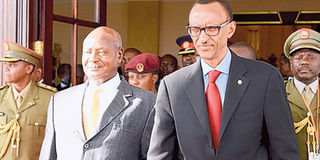Can regional groupings help change Africa?

Ugandan president Yoweri Museveni, currently the East African Community (EAC) chairman, and his Rwandan counterpart Paul Kagame at the end of trilateral meeting on regional infrastructure, trade and political integration- Entebbe, 25 June 2013. PHOTO I FILE
Arusha. Yosuba Jobe is not somebody, who wants to talk much. But he certainly wants his point heard loud and clear. As the deputy clerk of the Pan African Parliament, he has to maintain rapport with all member states of the African Union (AU) and their leaders.
Yet, one of his greatest concerns in recent times is the scale of corruption in the continent endowed with abundant resources he says can substantially alleviate poverty in a big way.
“There is a high proportion of poor people in Africa. Corruption is on high scale,” he said here recently during a symposium on the quality of public institutions in Africa.
To fight poverty and underdevelopment, he argues, Africa must make full use of the resources it is endowed with, and the abundant knowledge it has to develop the continent.
Development goals
But he insists that neither the AU nor the Pan African Parliament alone can drive the development goals of the continent alone.
“Coordination and cooperation as well as integration are very important. AU has a big task and has to move faster to pull the entire continent together,” he points out.
Mr Jobe turns to regional economic communities (RECs), which, he insists, should harmonise their activities and speak together.
“There are too many fragmented decisions, no coordination, duplication and wastage of money,” he said during the symposium hosted by the Pan African Centre for Policy Studies (PACPS), a policy think tank working closely with AU.
The centre was established as an independent institution, not-for-profit centre for research, capacity building, training and documentation for a modern African democratic governance.
Incidentally, the symposium held in Arusha a fortnight ago discussed the role of RECs often considered as ‘building blocks” or stepping stones in the process of continental integration.
RECs are not entirely new in the continent although their relevance or role has come to spotlight much more in recent years.
In fact, one of the objectives of the AU as reflected in the Constitutive Act is to coordinate and harmonise the policies between the existing and future RECs.
Currently, there are eight RECs recognised by the AU, one of them being the East African Community (EAC), which could be the oldest among them.
Those not much known in the EA region include the Community of Sahel-Saharan States (SEN-SAD) and the Arab Maghreb Union (Uma).
Others not very much familiar with Tanzanians are the Economic Community of Central African States (ECCAS) and the Intergovernmental Authority on Development (Igad) for the Horn of Africa states.
The rest are the Economic Community of the West African States (Ecowas), the Common Market for Eastern and Southern Africa (Comesa) and the Southern Africa Development Community (Sadc).
There had been discussions on how the continent - or rather the AU- should organise and render RECs more coherent and efficient to constitute the “building blocks” of the greater AU.
Creation of synergies
PACPS chairperson Ms Judica Amri Lawson called for the creation of synergies between different regional economic communities (RECs), saying they were important “building blocks” for Africa’s integration.
She intimated there was nothing wrong for AU member countries to belong to different RECs and according to her,only eleven of the AU’s 55 member states belong to one economic bloc.
Within the EAC bloc, only South Sudan is a member to one economic bloc (EAC).Tanzania is a member of EAC and the Southern Africa Economic Community (Sadc).
Burundi, Kenya and Uganda belong to three RECs each while Rwanda is a member of only two; EAC and Comesa.
At the continental level only 11 out of the 55 AU member countries are members of only one REC. These are Algeria, Botswana, Cameroon, Congo, Equatorial Guinea, Gabon, Lesotho, Mozambique, Namibia, South Africa and Swaziland.
All the other countries are members of more than one REC or have registered their intention to become members of another one.
Overtime some policy analysts have cautioned on the challenges of overlapping activities of many RECs on the continent.
Ms Karin Pluberg, a representative the German International Cooperation Agency (GIZ) said AU should brace up for complete reforms under Agenda 2063 if it wanted to discharge its duties well. She, however, cautioned on the challenges of overlapping activities of many RECs in the continent, suggesting it should be avoided for the sake of efficiency.
The President of the East African Court of Justice (EACJ) Dr Emmanuel Ugirashebuja said lack of information channels among the African states may have led to dismal performance of the RECs.
“National institutions may not be fully informed about the nexus between the regional framework and national framework,” he pointed out.
He called on the Arusha-based Centre to take stock on the performance and effectiveness of RECs in order to stimulate the integration of the continent, adding;
“Diverse legal systems, priorities, lack of information channels and political prejudice may pose challenges to the alignment of regional framework to national legislation,” he said.




